Introduction
Global warming is one of the most pressing issues facing humanity today. Its consequences are far-reaching, affecting ecosystems, economies, and communities worldwide. This article will break down the concept of global warming, its causes, historical context, and ongoing global efforts to combat it, making it clear and accessible to everyone.
What is Global Warming?
Global warming refers to the long-term increase in Earth’s average surface temperature due to human activities, primarily the release of greenhouse gases (GHGs) like carbon dioxide (CO₂), methane (CH₄), and nitrous oxide (N₂O). These gases trap heat in the atmosphere, leading to a gradual warming of the planet.
Greenhouse Gases (GHGs)
Greenhouse Gases (GHGs) are gases in Earth’s atmosphere that trap heat, contributing to the greenhouse effect. They allow sunlight to enter the atmosphere freely but prevent some of the heat from escaping back into space, leading to the warming of the planet.
Key Greenhouse Gases
Carbon Dioxide (CO₂):
- Sources: Fossil fuel combustion, deforestation, industrial processes.
- Responsible for the majority of human-induced warming.
Methane (CH₄):
- Sources: Agriculture (e.g., livestock digestion), landfills, natural gas leaks.
- More potent than CO₂ over short periods but exists in smaller quantities.
Nitrous Oxide (N₂O):
- Sources: Agricultural activities, industrial processes, combustion of organic matter.
- Extremely effective at trapping heat.
Fluorinated Gases (e.g., HFCs, PFCs, SF₆):
- Sources: Industrial applications like refrigeration and manufacturing.
- Synthetic gases with high global warming potential.
Water Vapor (H₂O):
- Naturally occurring; amplifies warming as it increases with temperature.
Why is Controlling Global Warming Necessary?
Extreme Weather Events:
- Global warming intensifies hurricanes, heatwaves, floods, and droughts.
Rising Sea Levels:
- Melting polar ice caps threaten coastal communities and ecosystems.
Biodiversity Loss:
- Species are struggling to adapt, leading to extinction risks.
Economic Impact:
- Climate change disrupts agriculture, increases disaster recovery costs, and affects global trade.
Human Health:
- Heatwaves, poor air quality, and changing disease patterns pose serious health risks.
Historical Context of Global Warming
Industrial Revolution (18th-19th Century):
- The widespread use of coal and fossil fuels began releasing large amounts of GHGs.
1950s Onward:
- Scientific evidence linked human activity to climate change, notably through the Keeling Curve, which showed rising CO₂ levels.
Keeling Curve
The Keeling Curve is a graph that represents the continuous measurement of carbon dioxide (CO₂) concentration in Earth’s atmosphere over time. Named after scientist Charles David Keeling, it is one of the most important scientific contributions to understanding global warming and climate change.
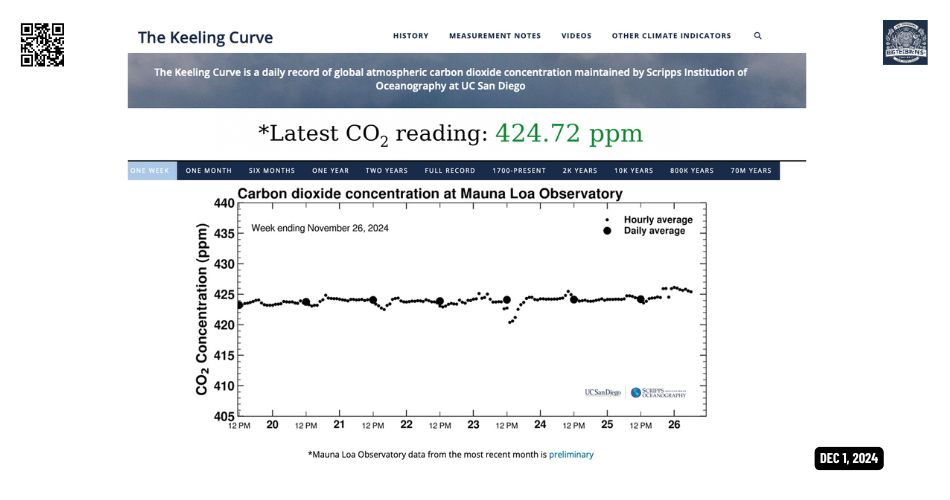
1970s-1980s:
- Growing environmental awareness led to the establishment of the Intergovernmental Panel on Climate Change (IPCC) in 1988.
Intergovernmental Panel on Climate Change (IPCC)
The Intergovernmental Panel on Climate Change (IPCC) was established by the United Nations Environment Programme (UNEP) and the World Meteorological Organization (WMO) in 1988.

The Intergovernmental Panel on Climate Change (IPCC) was established with the primary responsibility of conducting a thorough assessment of the current scientific understanding of climate change. As mandated by UN General Assembly Resolution 43/53 on December 6, 1988, its role involves evaluating the scientific knowledge about climate change, examining its potential social and economic impacts, and recommending strategies for mitigation and adaptation. Additionally, the IPCC was tasked with contributing to the groundwork for a possible international treaty aimed at addressing climate-related challenges.
United Nations Environment Programme (UNEP)

The United Nations Environment Programme (UNEP) is a global organization established by the United Nations in 1972, following the Stockholm Conference on the Human Environment. UNEP serves as the leading authority in environmental matters, providing guidance, advocacy, and coordination for international efforts to protect and improve the environment.
Global Efforts to Combat Global Warming
Significant Proceedings and Agreements
United Nations Framework Convention on Climate Change (UNFCCC) (1992):
- Established a global framework for climate negotiations.
- Resulted in key agreements like the Kyoto Protocol (1997) and Paris Agreement (2015).
Kyoto Protocol (1997)
- The Kyoto Protocol is an international treaty adopted on December 11, 1997, in Kyoto, Japan, under the United Nations Framework Convention on Climate Change (UNFCCC).
- It was the first legally binding treaty to commit industrialized countries and economies in transition to specific emission reduction targets.
- The treaty set binding targets for 37 industrialized nations and the European Union to reduce greenhouse gas (GHG) emissions by an average of 5% below 1990 levels during the first commitment period (2008–2012).
- The protocol placed the primary obligation on industrialized nations, adhering to the principle of “common but differentiated responsibilities”.
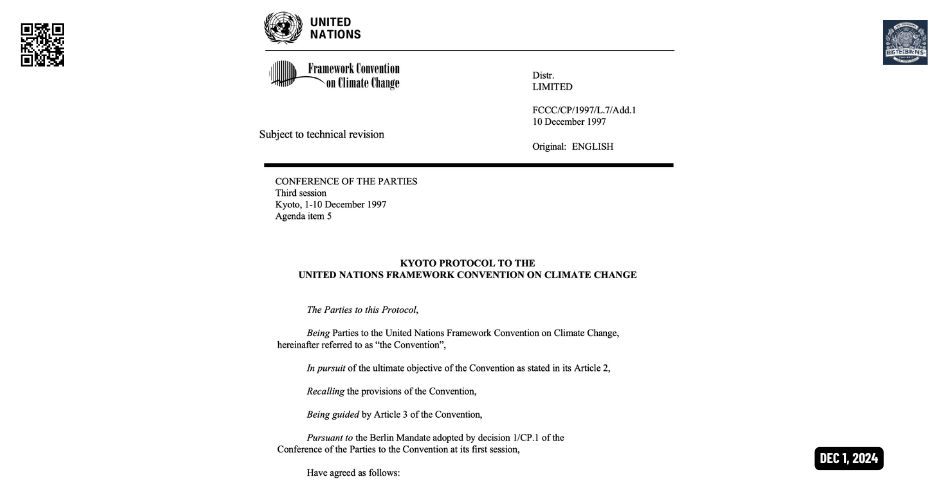
The Kyoto Protocol addressed six main greenhouse gases:
- Carbon dioxide (CO₂)
- Methane (CH₄)
- Nitrous oxide (N₂O)
- Hydrofluorocarbons (HFCs)
- Perfluorocarbons (PFCs)
- Sulphur hexafluoride (SF₆)
Paris Agreement (2015):
- Aimed to limit global warming to well below 2°C, with efforts to stay below 1.5°C.
- Countries submit Nationally Determined Contributions (NDCs) outlining their climate goals.
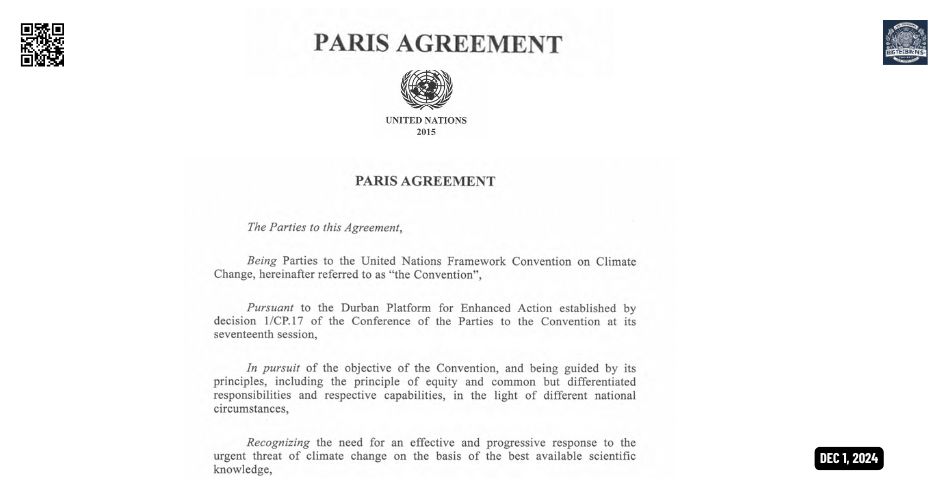
Intergovernmental Panel on Climate Change (IPCC):
- Publishes scientific reports to guide policy decisions.
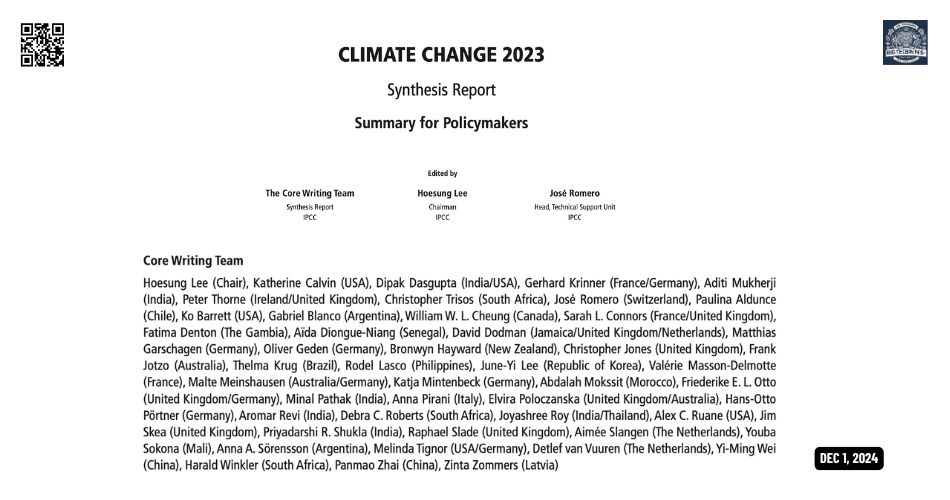
Funds Allocated
Green Climate Fund (GCF):
- Mobilizes billions of dollars to help developing countries transition to clean energy and adapt to climate impacts.

Bilateral and Multilateral Aid:
- Developed nations pledged $100 billion annually under the Paris Agreement to support climate action in poorer countries.
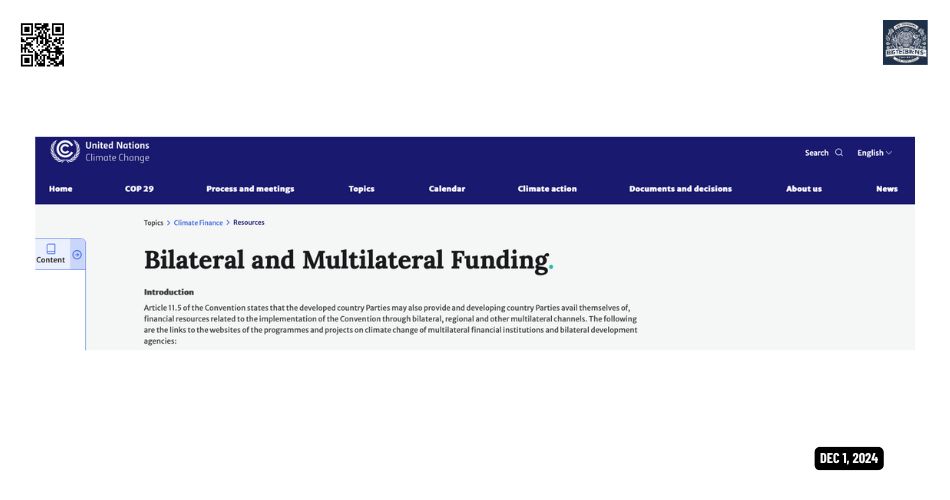
MULTILATERAL FINANCIAL INSTITUTIONS
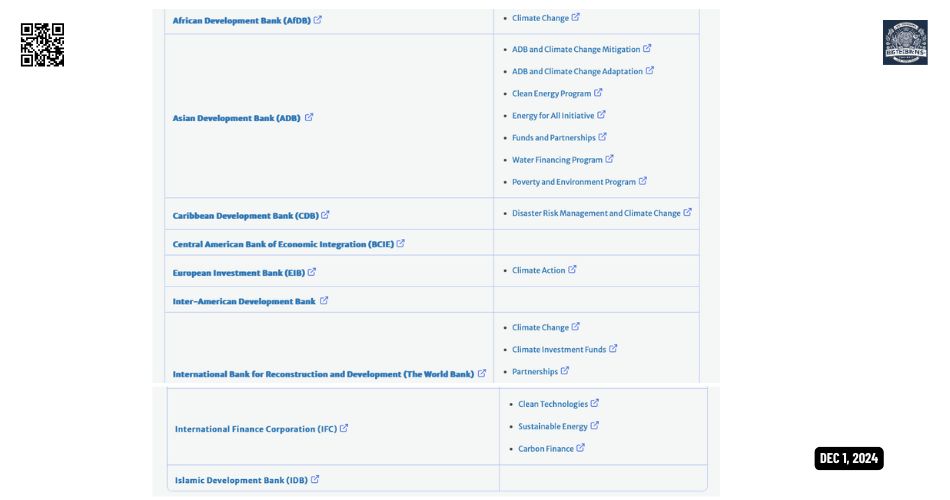
BILATERAL DEVELOPMENT COOPERATION AGENCIES
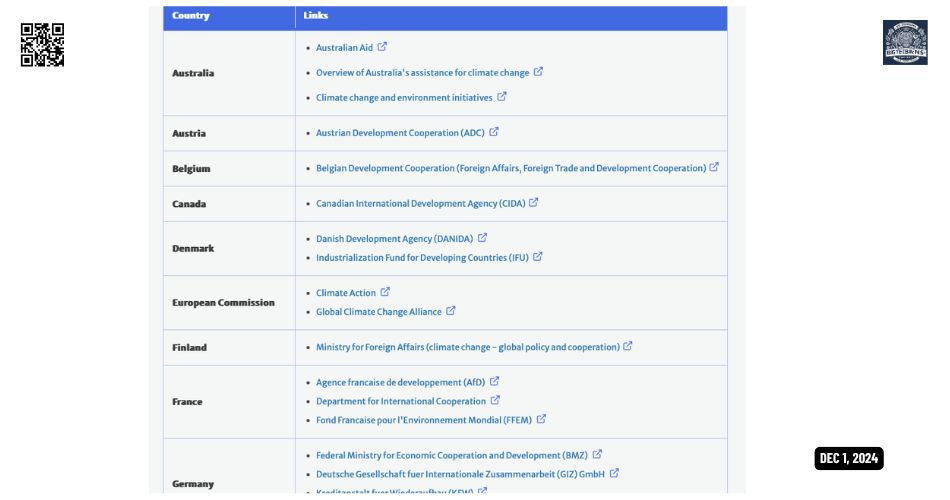
International Reforms and Projects
European Green Deal:
- Aims for the EU to be carbon-neutral by 2050 through renewable energy and sustainable practices.
C40 Cities Initiative:
- Urban leaders collaborate to reduce emissions in major cities worldwide.
Renewable Energy Projects:
- Countries like India and China are leading solar and wind energy installations.
- Programs like the International Solar Alliance (ISA) promote solar power.
Reforestation Efforts:
- Initiatives like the Bonn Challenge aim to restore 350 million hectares of degraded land by 2030.
The Role of Countries in Fighting Global Warming
United States:
- Introduced the Inflation Reduction Act, the largest investment in clean energy in U.S. history.
- The Inflation Reduction Act of 2022 (H.R. 5376) focuses on reducing the federal deficit, curbing inflation, expanding renewable energy investments, and addressing healthcare costs.
- Signed into law by President Biden on August 16, 2022, it represents a streamlined version of the earlier Build Back Better proposal.
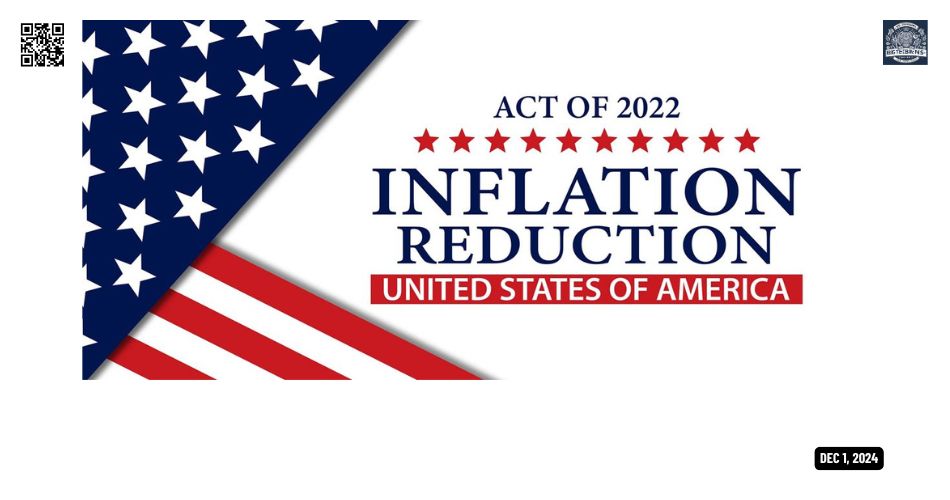
China:
- The world’s largest renewable energy producer.
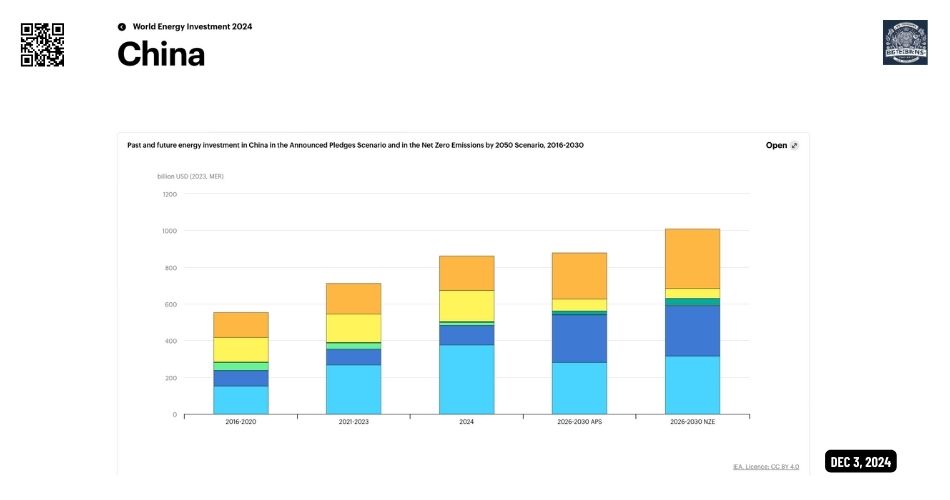
African Nations:
- Leading adaptation strategies, despite contributing the least to emissions.
COP29 | 2024 United Nations Climate Change Conference

The Conference of the Parties (COP), is held annually, with the Presidency rotating between the five recognised UN regions.
The five recognized United Nations regions, which rotate the presidency of the Conference of the Parties (COP), are:
- Africa
- Asia-Pacific
- Eastern Europe
- Latin America and the Caribbean (GRULAC)
- Western Europe and Other Groups (WEOG)
The 2024 United Nations Climate Change Conference, commonly referred to as COP29, was the 29th session of the Conference of the Parties under the UNFCCC. It took place in Baku, Azerbaijan, from November 11 to November 22, 2024. Mukhtar Babayev served as the conference president, with Samir Nuriyev leading the Organizing Committee.
Significant progress was made on carbon markets under Article 6 of the Paris Agreement. Countries finalized frameworks for trading carbon credits and established mechanisms ensuring environmental integrity and human rights safeguards. Transparency efforts were bolstered by the adoption of new reporting tools and the submission of Biennial Transparency Reports by several parties.
Conference Locations and Dates
- COP1: Berlin, Germany (March 28 – April 7, 1995)
- COP2: Geneva, Switzerland (July 8–19, 1996)
- COP3: Kyoto, Japan (December 1–11, 1997)
- COP4: Buenos Aires, Argentina (November 2–13, 1998)
- COP5: Bonn, Germany (October 25 – November 5, 1999)
- COP6: The Hague, Netherlands (November 13–25, 2000; resumed in Bonn, July 2001)
- COP8: New Delhi, India (October 23 – November 1, 2002)
- COP9: Milan, Italy (December 1–12, 2003)
- COP10: Buenos Aires, Argentina (December 6–17, 2004)
- COP11: Montreal, Canada (November 28 – December 9, 2005)
- COP13: Bali, Indonesia (December 3–15, 2007)
- COP14: Poznań, Poland (December 1–12, 2008)
- COP15: Copenhagen, Denmark (December 7–18, 2009)
- COP16: Cancún, Mexico (November 29 – December 10, 2010)
- COP17: Durban, South Africa (November 28 – December 11, 2011)
- COP18: Doha, Qatar (November 26 – December 8, 2012)
- COP19: Warsaw, Poland (November 11–22, 2013)
- COP20: Lima, Peru (December 1–12, 2014)
- COP21: Paris, France (November 30 – December 12, 2015)
- COP23: Bonn, Germany (hosted by Fiji, November 6–17, 2017)
- COP24: Katowice, Poland (December 2–14, 2018)
- COP25: Madrid, Spain (hosted by Chile, December 2–13, 2019)
- COP26: Glasgow, UK (October 31 – November 12, 2021)
- COP27: Sharm El-Sheikh, Egypt (November 6–20, 2022)
- COP28: Dubai, UAE (November 30 – December 12, 2023)
- COP29: Baku, Azerbaijan (November 11–22, 2024)
African Countries That Have Held the COP Presidency:
- South Africa hosted COP17 in Durban (2011).
- Morocco hosted COP7 in Marrakesh (2001) and COP22 (2016), also in Marrakesh.
- COP12: Nairobi, Kenya (November 6–17, 2006)
Conclusion
Global warming represents one of the most pressing challenges of our time, with far-reaching implications for ecosystems, economies, and societies worldwide. As greenhouse gas emissions continue to rise due to human activities, the Earth’s climate is undergoing unprecedented changes, including rising temperatures, melting ice caps, and more frequent extreme weather events.
FAQs on Global Warming
1. What is global warming?
- Global warming refers to the long-term increase in Earth’s average surface temperature caused primarily by human activities, particularly the burning of fossil fuels, which releases greenhouse gases like carbon dioxide and methane. These gases trap heat in the atmosphere, leading to changes in climate patterns.
2. What are the main causes of global warming?
The primary drivers include:
- Burning Fossil Fuels: For energy production (coal, oil, gas).
- Deforestation: Reduces the Earth’s ability to absorb CO₂.
- Agriculture: Emissions from livestock and fertilizers.
- Industrial Processes: Release of fluorinated gases and other pollutants.
3. How does global warming impact the planet?
Global warming leads to:
- Melting Ice Caps: Rising sea levels and flooding.
- Extreme Weather Events: Increased frequency of hurricanes, droughts, and heatwaves.
- Biodiversity Loss: Habitat destruction affecting wildlife.
- Food Security Issues: Altered agricultural productivity.
4. What are some solutions to combat global warming?
- Transition to Renewable Energy: Wind, solar, and hydroelectric power.
- Reforestation: Restoring forests to absorb CO₂.
- Energy Efficiency: Reducing energy waste in industries and households.
- Global Agreements: Policies like the Paris Agreement to limit temperature rise.
5. What is the difference between global warming and climate change?
- Global warming refers specifically to the rise in Earth’s surface temperature, while climate change encompasses broader changes, including altered weather patterns, sea-level rise, and changes in ecosystems.
6. How can individuals help reduce global warming?
- Reduce Energy Use: Turn off unused lights and appliances.
- Adopt Sustainable Transportation: Use public transport, cycle, or drive electric vehicles.
- Waste Reduction: Recycle and compost to minimize landfill emissions.
- Advocate for Change: Support policies and initiatives combating global warming.
Reference
- WWF | https://www.worldwildlife.org/
- Environmental Defense Fund (EDF) | https://www.edf.org/
- NASA | https://climate.nasa.gov/
- IPCC | https://www.ipcc.ch/
- International Renewable Energy Agency (IRENA) | https://www.irena.org/
- Past COP conferences overview
- UNFCCC

